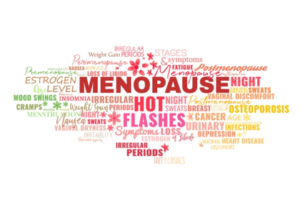
Many people believe that menopause lowers sex drive, but does it?
No.
Let me say that again, for the people in the back: Menopause is not what’s killing your sex drive!
The truth is that no matter your age or stage of life, you have the ability to desire sex and to have earth-shattering orgasms.
So why do so many people try to tell us otherwise?
Could it be that there’s a lot of money to be made off of women in their prime thinking that their bodies have become dysfunctional? (Hint: it is.)
Big Pharma has spent billions trying to find the Viagra for women, but they haven’t succeeded. This is because female arousal is complex.
For the next few posts, I’ll be busting menopause myths and discussing the real reasons women loose their desire for sex. And I’ll provide some tools that will help you reclaim your desire and reignite your love life.
Myth: Decreased Estrogen & Progesterone in Menopause Reduce Sexual Desire
Nope.
While it’s true that hormones play a role in arousal and sexual desire, they’re not the main drivers of it.
Think about your pre-ovulation stage of your menstrual cycle. Estrogen rises through the first half of the cycle and peaks just prior to ovulation. Are you (or were you) especially aroused during that time of the month? While some women experience a surge of arousal then, just as many women experience nothing. Some women experience their highest levels of desire while menstruating, or just prior, when estrogen levels are lowest!
Birth control pills, which cause the body to mimic menopausal hormone levels, can greatly impact some women’s desire for sex. But the operative word is “can.” Many women on the pill still experience normal sexual desire.
Think of another example of varied hormones having widely differing responses in women: Pregnancy. During pregnancy, estrogen and progesterone levels soar. Some pregnant women desire sex all the time; others desire absolutely no sex at all.
It’s important to remember that hormones affect all women differently and to different degrees.
Conclusion: The connection between hormones and sexual desire is tenuous at best.
You shouldn’t assume that just because your hormones are shifting, you won’t feel as much sexual desire post-menopause. There are many other, more important factors that impact your desire for sex. In my next posts, I’ll discuss these and give you some tips to address them.
But if you can’t wait until then, please check out my self-paced online masterclass, Reclaim Your Desire. This class will teach you how to gain sexual confidence and get your love life back on track. In it, you will learn how your unique sexual blueprint impacts your relationship with sex as an adult. By identifying limiting beliefs and removing blocks, you will reshape your relationship with sex and intimacy. The class will also give you tools to process negative emotions in your body and learn how to connect with the emotions.

Leave a Reply